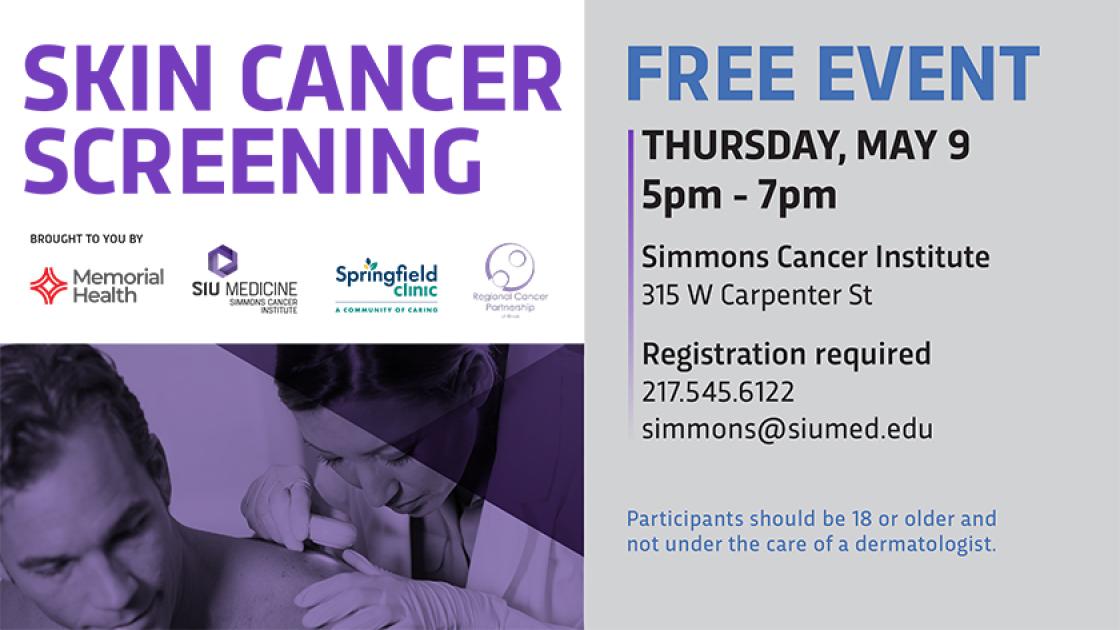
SIU Medicine Q & A: The Truth on Tanning
In the summer months, many pool and beach-goers thirst to have sun-kissed, glowing skin. However, sunbathing can result in serious and life-threatening consequences.
SIU Medicine dermatologist, Sacharitha Bowers, MD, answers reveal that proper steps can help you protect your skin this season.
Q & A:
Is there such a thing as a healthy tan?
No, unfortunately, there is no such thing as a healthy tan! Any amount of ulraviolet (UV) exposure that leads to tanning can contribute to harmful effects in the skin, such as increased aging of the skin and skin cancer. Additionally, a tan cannot block further ultraviolet light exposure, so there is no benefit to having a "base tan."
Is there an equal or greater risk of getting skin cancer, including melanoma, when being exposed to UV rays by the sun vs in tanning beds?
Both types of UV rays, UVA and UVB, are present in natural sunlight, and both types of rays can lead to an increased risk of skin cancer. Tanning beds put out mostly UVA rays, as does natural sunlight, but natural sunlight also has very potent and powerful UVB rays, which are often known as the "burning rays." Though both types of UV exposure can be harmful, tanning beds have concentrated UVA rays that often don't lead to a sunburn, which is the body's response to excess sun exposure. Without sunburn, these damaged cells can continue to grow unchecked, which may increase the risk of all types of skin cancer, including melanoma.
Do tanning beds damage your skin? If so, are there any tanning beds that do not damage your skin?
UVA rays from tanning beds can cause increased aging of the skin such as sun spots and premature wrinkling, and they can also lead to DNA damage that causes skin cancer. When it comes to skin cancer and sun damage, there no such thing as a safe tanning bed!
Is there a safe route that one can take to have glowing skin in the summer? Are spray tans and/or self-tanning products a safe solution to achieving golden skin?
The safest route for a tanned look is the sunless route! Spray tans and/or self-tanning products are generally a safer solution to having a tanned appearance to your skin tone. They create a temporary stain on the skin which can lead to a bronzed appearance. But keep in mind that they do not provide any type of sun protection, so a sunscreen and all sun protective measures should still be followed. There can be a risk of developing an allergic reaction to one of the ingredients in either the spray tan or the self-tan product, so if you notice a skin reaction to any of these products, you should consult your physician.
My best recommendation for glowing skin, year-round and not just in the summer, is to not smoke, eat a well-balanced and nutritious diet, and have great skin care! That means using a gentle body cleanser and moisturizing after bathing with a moisturizer that is fragrance free and has minimal extra ingredients. Most drug store brands have high quality and affordable options.
And lastly, use your sunscreen and sun-protective measures diligently!
What precautions should be taken this summer while doing activities outdoors to protect one’s skin?
Follow these tips to protect your skin from the sun's damaging ultraviolet rays and reduce your risk of skin cancer:
- It is important to seek shade whenever possible, especially when the sun's rays are the strongest between 10 am and 2 pm.
- Wear protective clothing whenever possible, such as a lightweight long-sleeved shirt, paints, a wide-brimmed hat and sunglasses that offer appropriate UV protection.
- Apply sunscreen to all exposed areas of your skin. When purchasing a sunscreen, look for products that are labeled "broad-spectrum", which means they block both UVA and UVB rays. We recommend using at least an SPF30, and anything up to an SPF 50 is easy to find and affordable. To keep the level of sun protection consistent as you remain outdoors, we recommend reapplication of the sunscreen every 2 hours, or after swimming or intense sweating. Use sunscreen even on cloudy days, as UV rays penetrate through the clouds. The right amount of sunscreen for adults is about 1 ounce for the whole body per application. This is enough to fill a standard 1 oz shot glass, or 2 tablespoons. If you can't apply sunscreen this frequently, consider wearing sun-protective clothing, which has a UPF (ultraviolet protection factor) rating.
- Sunscreens do expire, and an expired sunscreen may not effectively guard against UV rays. I recommend checking the expiration date right when you buy the product, and then write it on the bottle in larger numbers with a permanent marker so that you can see it properly.
- Be careful around water, snow and sand. These surfaces can reflect UV rays and can increase the chance of sunburn.
What should one do if they notice abnormal changes to their skin, and what might these abnormal changes look like?
It is important to regularly perform self-exams of your skin so that you can identify changes to any of your moles, or find a new mole or unusual looking spot if it arises.
- If you do notice a changing skin lesion, or a new lesion that stands out and particularly looks different from other spots on your body, then you should call your doctor, or see a dermatologist as soon as possible.
- Keep an eye out for a change in appearance of a mole, such as a change in size, shape, thickness, texture, or color, or the presence of a new symptoms, such as pain, crusting, scabbing, or bleeding.
- If you notice the development of a new mole, especially if it is growing quickly, has multiple colors, an irregular border or shape, or does not appear symmetric in some way, then consult with your physician or dermatologist.
- Additionally, if you notice a non-healing spot or sore, especially if it has been present for more than a month, call your physician or dermatologist for further evaluation.
For other great resources regarding how you can protect your skin from skin cancer, refer to http://www.skincancer.org.
To make an appointment with SIU Dermatology, call 217-545-8000.




